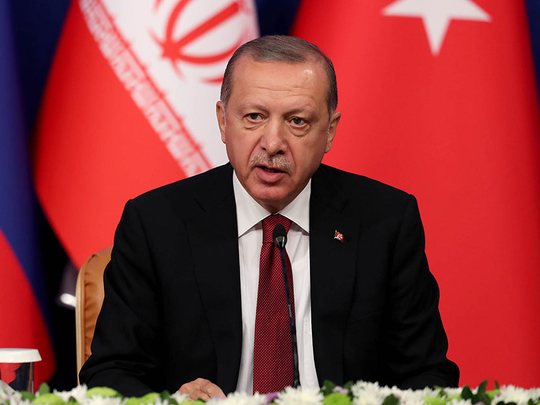
As a new bipolar world order emerges pitting the United States and its Western allies against Russia and China’s growing influence, the geopolitical deck shares are being rearranged. Turkish President Recep Tayyip Erdogan would prefer to straddle the fence. He insists he seeks good relations with every nation but in reality he is veering away from Washington towards Moscow.
Major cracks have formed in the long-held alliance between the United States and fellow Nato-member Turkey that went from bad to worse following the 2016 failed coup over the Trump administration’s reluctance to extradite Turkish cleric Fethullah Gulen accused of being the coup’s orchestrator.
Moreover, the United States frowns upon Turkey’s drift away from its former secular values and support of armed Islamist groups. Repeated Turkish air strikes on Kurdish targets in Syria and Iraq is yet another thorn in America’s side that elicited a threat from President Trump to devastate the Turkish economy.
Erdogan’s relationship with his Russian counterpart Vladimir Putin has been somewhat of a rollercoaster over the past decade hitting rock bottom when they stood on opposing sides of the Syrian conflict.
The latest row over Turkey’s purchase of a sophisticated Russian missile defence system, the S-400, has the potential to create an irreparable split. The US has warned Ankara that if it takes delivery scheduled for next month, it will take punitive measures to include sanctions, the expelling of Turkish pilots and the blocking of Turkey’s ability to procure US F-35s and Patriot missiles.
America suspension of a F-35 delivery indicates Washington’s resolve. Ankara is mulling other options such as Russia’s Su-57 or Chinese J-31 stealth fighters reported the Turkish daily Yeni Safak.
Thus far, Erdogan is undeterred threatening to take reciprocal measures if sanctioned. Turkey’s Foreign Minister Mevlut Cavusoglu recently confirmed, “We are determined on the S-400 issue. No matter what the results will be, we will not take a step back”.
Migrants
Concerned that Ankara is falling into Russia’s embrace fearing divided loyalties, Nato is also applying pressure on Erdogan to reconsider. For the first time commentators debate on whether Turkey should be expelled from the treaty.
Likewise, EU-Turkish relations are decidedly icy.
The days when Turkey was seen as a regional economic and social model preparing for membership of the European Union are long gone. Last year, Brussels put negotiations on hold and in its annual report on the status of Ankara’s bid the EU Commission criticised Turkey for its democratic “backsliding” in terms of civil liberties and the rule of law.
Whether Erdogan cares is doubtful. His enthusiasm to join the Union waned years ago. Besides he knows that Ankara’s cooperation is indispensable for European states to stem the flow of migrants from reaching their shores. He has another card in the form of his country’s Incirlik Air Base where US airmen are stationed. Nevertheless the mutual antagonism has the potential to reach breaking point. Indeed, in this cooling climate the US is eyeing-up an alternative base in Greece.
EU states are strongly backing Cyprus in a dispute with Turkey over its exploration for gas off the Cypriot coastline. France’s President Emmanuel Macron has affirmed his solidarity with Cyprus and respect for its sovereignty. Europe “will not show weakness on this matter,” he said.
Turkstream project
Erdogan’s relationship with his Russian counterpart Vladimir Putin has been somewhat of a rollercoaster over the past decade hitting rock bottom when they stood on opposing sides of the Syrian conflict resulting in a Turkish F-16 shooting down a Russian attack aircraft. The friction between these two strongmen evaporated making way for cooperation and the signing of deals such as the Turkstream project, a gas pipeline from Russia to Turkey crossing the Black Sea and the construction of a nuclear power plant.
With a fast-looming July 31 American-imposed deadline for the Turkish government to comply with its demands the question is will President Erdogan surrender to US diktats which will not be appreciated by his largely anti-western following? Or will he align his nation’s fortunes with America’s adversaries Russia, China and Iran, a country with which he is solidifying ties? Erdogan is known for his fiery rhetoric and for backing down when the mercury rises so anything is possible. Time will tell!
Linda S. Heard is an award-winning British political columnist and guest television commentator with a focus on the Middle East.









